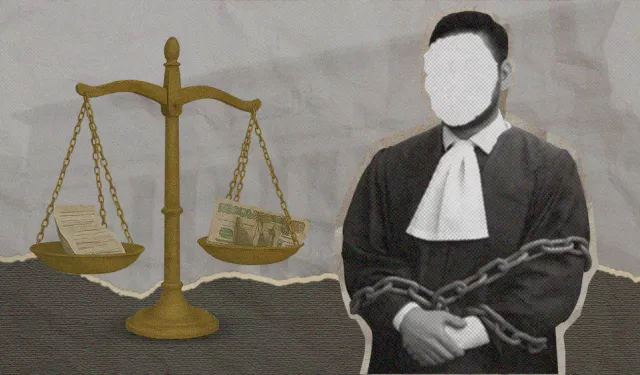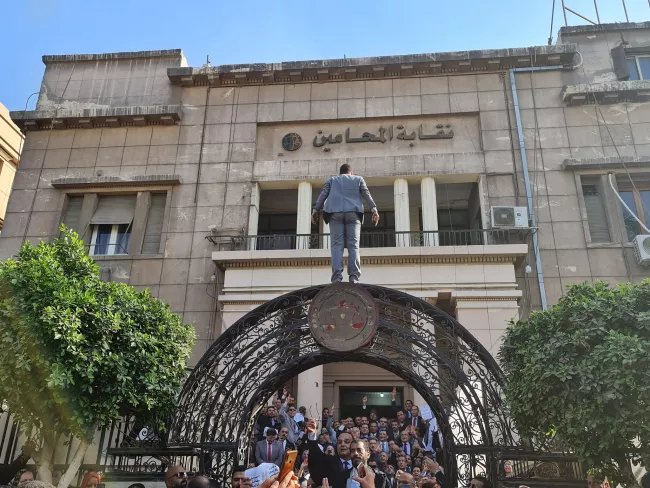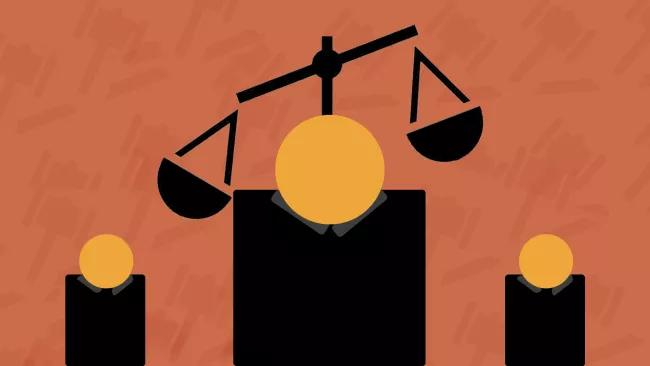
A price tag on Justice: Egypt's lawyers battle new court fees
Hanaa Ahmed joins many other lawyers in opposing the new “automation” fees.
She argues they burden litigants and infringe upon citizens’ right to justice, which goes against her belief that access to litigation and practising law are inseparable.
Hanaa spoke to Al Manassa ahead of the Lawyers Syndicate Ad Hoc General Assembly, which was scheduled for June 21 but halted by an administrative court ruling on June 18. The GA was part of the planned escalations announced by the Syndicate on May 14 to oppose the new fees. The meeting was intended to vote on either striking or staging sit-ins to protest the new fees levied by the heads of appeal courts for digitized services.
The court justified its decision by claiming the Syndicate’s call for such a meeting was unjustified legally and practically, arguing that opting for strikes and sit-ins would disrupt the justice system and infringe upon the right to litigation. The court believes the syndicate is evading its legal responsibilities by resorting to a GA meeting instead of pursuing constitutional and legal avenues for objection, such as contacting relevant authorities or filing lawsuits.
“My livelihood depends on enabling people to go to court,” said Hanaa, who operates a law office from her home in a village near El-Mahalla El-Kubra. Most of her clients are low-income. “When I tell one of them my fee is 2,000 pounds, I see helplessness in their eyes.”
Lawyers’ fees have risen following increases in court fees. In March, Mohamed Nasr Sayed, President of the Cairo Court of Appeals introduced a new 33-pound fee (about $0.65) per page for “reviewing case files.” Fees for certified copies of judgments and expert reports have also increased. “Some fees have increased from 5 to 500 pounds ($0.09-$10) in one go,” Syndicate Treasurer Abdel Meguid Abu Haroun told Al Manassa.
Such increases impact various services, including case filing, document folders, public notices, bailiff service, copies of judgments, court transcripts, and certificates. A single case could now incur thousands of pounds in fees alone, placing a heavy burden on litigants.
The right to litigation
Hanaa Ahmed's clients are not the only ones bearing helplessness. Alexandria-based lawyer Mohamed Ramadan echos her concerns, telling Al Manassa that rising costs are denying citizens their constitutional right to litigation and hindering lawyers’ ability to mount adequate defenses.
“Applications and statements of case are now being calculated by page count, not by whether they include enough legal evidence to support the case,” he noted.
With new fees reaching thousands of pounds, Ramadan stated that “every procedural step in court now comes with a price tag.” He believes this poses “a direct threat to the right to litigation since citizens bear the financial burden,” especially during appeals, which demand legal expertise and additional expenses, making them accessible primarily to the wealthy.
On March 8, the Syndicate Council declared its opposition to the fees, stating these decisions “are unconstitutional” and threatened to cease cooperation with court fee offices at all judicial levels nationwide.
In a statement, the Syndicate emphasized that these fees “infringe upon the constitutionally guaranteed right to litigation, and harm both citizens and lawyers,” while highlighting the absence of public consultation before these decisions were made.
“The fee hikes violate Article 97 of the constitution, which states that litigation is a right that is safeguarded and an inalienable right for all,” Ramadan argued. “These fees risk transforming access to justice into a privilege, potentially forcing the poor towards informal dispute resolutions, such as reconciliation sessions, which offer no legal oversight or guaranteed rights.”
This concern is already playing out on the ground, according to Hanaa, who noted that many villagers now resort to customary councils, which are “faster and cheaper than formal judiciary,” and often operate without fees or lawyers.
No litigation for the poor
Ramadan highlights another crisis; lawyers may cease accepting pro-bono cases. “Sometimes lawyers forgo their fees when clients can’t pay, and they even cover expenses out of their own pockets. That will become impossible now,” he noted.
Hanaa shares his concern. “A case that used to cost 1,000 pounds will now cost three or four times that. I get cases from people who genuinely can’t pay, people I know personally from my village. I used to help as much as I could, but I won’t be able to.”
While Hanaa cites Article 98 of the constitution, which mandates that, “The law shall provide all means by which those who are financially unable can resort to justice and defend their rights,” a position paper by the Egyptian Front for Human Rights/EFHR referenced a March 7, 2004 ruling by the Supreme Constitutional Court (Case No. 64 of Judicial Year 21).
The ruling affirmed the importance of mechanisms to exempt financially incapable individuals from legal fees, a principle later codified in Article 23 of the Judicial Fees Law, as a safeguard against depriving them of their right to legal recourse.
The EFHR paper recommends ensuring “effective and easy access to fee exemption mechanisms for those unable to pay.” Shorouk Sallam, head of EFHR’s legal unit and the paper’s author, noted that these exemption clauses are not enforced.
“With the new increases, litigation will become prohibitively expensive,” Sallam told Al Manassa. “Previously, court fees were nominal and manageable; lawyers’ fees were the bigger cost. Now, court fees are a significant burden, possibly exceeding legal fees.”
The paper also highlights the risk of nullifying verdicts based on unlawfully collected fees, potentially opening the door to challenging both procedures and judgments.
Battle against marginalization
Concerns that justice is becoming a commodity for the wealthy intersect with lawyers’ decades-long fight against curtailing their role, according to lawyer and syndicate member Asaad Heikal. He sees current developments as a continuation of efforts to marginalize the legal profession and suppress its mission, within a broader context of restriction and exclusion.
Speaking to Al Manassa, Heikal outlined what he called a “70-year campaign against lawyers,” beginning with the syndicate’s dissolution after the July 1952 revolution. This was followed by the imposition of state guardianship in the 1990s, and further restrictions through laws like the Anti-Terrorism Law and the Law on Terrorist Entities. “All of this came at the expense of general freedoms, particularly for lawyers, who defend the application of the law and constitution.”
Heikal described a long-standing struggle with the authorities, with lawyers consistently defending the constitution and rule of law. “This has put them in the crosshairs of a regime that refuses oversight or accountability, especially amid severe repression, declining rights and freedoms, and a weakened syndicate that has often failed in its responsibilities. Things have now escalated to the point of jeopardizing lawyers’ livelihoods through intense financial pressures.”
Heikal dismissed “automation” as a hollow justification for modernization. He noted that digital transformation in the courts has not been accompanied by real infrastructure improvements or procedural streamlining. Courts still grapple with case backlogs, understaffing, and a lack of basic logistical services.
He cited the example of lawyers with cases in the Matariya Misdemeanor Court, who now must travel an additional 80 km to New Cairo’s Court Complex in the fifth settlement after sessions were moved there in 2021. This shift ignored a legal mandate requiring a misdemeanor court in every police district and dismissed lawyers’ requests to relocate sessions to the closer Amiriya Court Complex.
Unconstitutional moves
Beyond the practical and professional concerns raised by lawyers and rights advocates, a deeper constitutional issue emerges regarding the principle that no one may be charged fees without a legal basis.
Law No. 90 of 1944, as amended, regulates judicial and documentation fees in civil matters, defining fee types (proportional, fixed, and service-related) and outlining their calculation and collection at various litigation stages.
No financial burden, including fees, should be imposed on citizens without a law enacted by the legislative authority, according to Sallam. She described this as a well-established principle in Egypt’s legal system, rooted in the rule of law.
Sallam explained that the Judicial Authority Law (No. 46 of 1972) regulates the work of courts and their presidents but does not authorize them to impose new fees.
“At most, a court president can, under executive regulations or administrative decisions based on legal delegation, determine how to collect or calculate a proportional fee based on the case’s value. But they cannot create new fees,” she said.
She referenced a 2004 Supreme Court ruling clarifying a judge’s discretionary powers, as well as an administrative court ruling obtained by the Egyptian Center for Economic and Social Rights. That ruling overturned a judicial decision to impose extra fees for issuing and accepting judgments and certificates at the Mansoura Family Prosecution, citing the lack of any legal provision in Law No. 46 of 1972 granting court presidents such authority.
“A court president’s legal right to set fees means they can estimate the size of a claim,” Sallam explained. “For instance, the law stipulates that civil cases incur a proportional fee of 7.5%. The court president may assess the claim at 100,000 pounds and thus impose a fee of 7,500 pounds. But they cannot raise the fee to 10% or create a new fee without legal backing.”
Law No. 90 of 1944 has undergone multiple amendments, most recently in 2009, primarily to introduce new litigation fees, supporting her claim.
According to Asaad Heikal, the number of registered lawyers is nearing 700,000, which includes all who have ever joined. The actual number of GA members who would be affected by the new fees was around 322,000 as of the last election in March 2024.
While many lawyers and rights advocates dissect the intricate dangers of excessive court fees, Hanaa Ahmed grapples with a more immediate challenge: simplifying these complex issues for her low-income clients as she anxiously anticipates the impact on her livelihood. Meanwhile, the Syndicate stands firm, insisting on the lawyers' right to protest “unjust and illegal fees.” This divergence sets the stage for an appeal and a continued struggle, vividly highlighting the inherent tension between the escalating cost of justice and its fundamental accessibility.
(*) A version of this article first appeared in Arabic on June 16, 2025.


